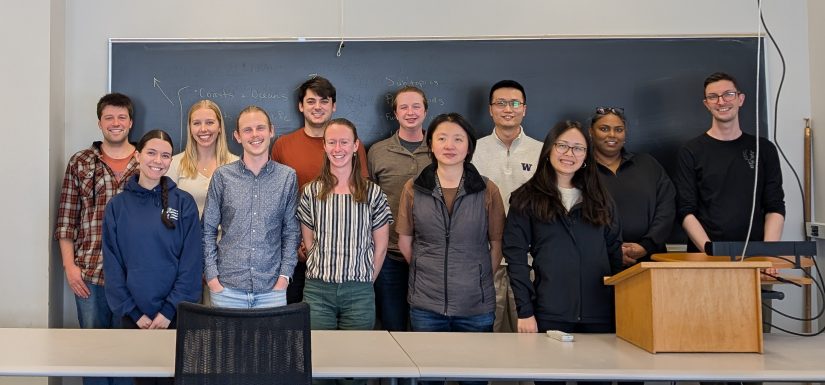Climate change and communication go hand-in-hand for PNW Climate Ambassadors
We’re living in a digital age, where the ability to find information (or even at times misinformation) is instant wherever you are in the world. This comes at the same time we’re at a critical juncture for climate research, where studying our changing world is more important now than ever. For Amirah Casey, a graduate student at SAFS, she knows that communication is vital to make impactful changes, and so applying for the Pacific Northwest (PNW) Climate Ambassadors program was a no-brainer.
The PNW Climate Ambassadors program at the University of Washington trains UW graduate students studying climate change, its impacts, or potential responses to effectively engage with various sectors of the public. Comprised of a cohort of 10 graduate students from different colleges across UW, researching topics from chemical oceanography and the impacts of urbanization on salmon, to environmental public policy and the evolution of ancient ecosystems, the program prepares students to develop presentations on a topic related to their climate science interest and expertise.
The PNW Climate Ambassadors program is a collaboration between the Program on Climate Change (PCC), the Washington State Climate Office (WASCO) and the UW College of the Environment Communications Team.
Amirah is a student among the first cohort to be PNW Climate Ambassadors. “It feels really exciting to be a part of this pilot program. I knew it would be a great opportunity to get more involved in the climate community and get necessary training to advance my career,” she said. “When applying, reading that we would be trained to “effectively engage with various sectors of the public” aligned with my goal of practicing this skill as much as possible while in graduate school. Plus, when it comes to climate change, we all know that it can be a sticky subject, so learning to communicate about it effectively is very important.”
The first step towards being a PNW Climate Ambassador was to undertake climate communication training from the WASCO and the Climate Impacts Group (CIG). Students got to practice some of the techniques they learned with an exercise at the end of the training. “Next, we were split into teams give our interests and expertise, and we designed presentations about a give topic that we added to a slide library,” Amirah shared. These presentations can be requested by the public by visiting the PNW Climate Ambassadors website. “Once we get a request through and accept, we use the slide database and other provided materials to tailor a presentation to the specific audience requesting it. Before presenting, we practice our talk with other ambassadors, one of our mentors from CIG, WASCO or PCC, or another expert in the area we are presenting on,” she added. Initial training was completed in May 2025, and although Amirah hasn’t yet had a presentation request, she’s excited for when the opportunity does arise.

Amirah’s focus area for her PNW Climate Ambassador presentation is water, droughts, and flooding. The slides discuss sea level rise, precipitation, and other issues in as much detail as possible while also keeping it concise and to the point. This is an essential skill for those engaged in climate research: how to share the importance of your work to the world, while also ensuring it’s engaging, impactful, and understandable for those with a non-science background. “My group also homed in on making the slides visually appealing and easy to read, while not being text heavy,” Amirah said. “In this presentation, I got to talk about things within my expertise, but also some things outside of it, like flooding. This was a great learning experience, and I got very valuable feedback from my fellow ambassadors and CIG mentor, Guillaume Mauger.”

Among the highlights of the program so far for Amirah has been receiving climate communication training, especially today in a time of uncertainty in climate policy and the spread of misinformation. “As someone who wants a career bridging science and policy, it will be essential for me to continue to develop these skills. There’s a lot of misinformation out there about climate impacts, as well as some distrust in science, and so having people who are trained to communicate about these issues is critical to get across clear and accurate information,” she said. “I am grateful to this program for giving me a chance to build on my climate communicate skills, and to my advisor, Dr. Mark Scheuerell, who has also been helping me with these techniques.”
After joining the PNW Climate Ambassadors program, Amirah felt inspired to get more involved in climate solutions and be present in as many climate spaces as possible. One of the opportunities that arose for her was volunteering at the Climate Solutions annual dinner, held in May 2025. “The organization is focused on, you guessed it, climate solutions! I helped them set up the dinner in downtown Seattle and checked in guests, including former Governor Jay Inslee,” Amirah shared. “I made sure to talk to him about what is going on with NOAA and USGS, which are the organizations that my committee members work for, especially because they are currently under fire for lack of a better term. I also thanked him for his policies while he was in office that were supportive of science, education, and recovering and protecting Washington state wildlife.” While she was volunteering, Amirah was recruited by PNW Climate Week to help out with event planning and logistics, which took place in Seattle from 16-25 July 2025. PNW Climate Week involves community-powered events that shine a spotlight on the Pacific Northwest’s role in climate leadership and innovation.
